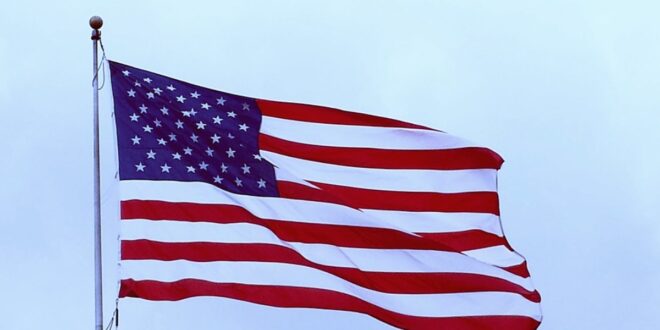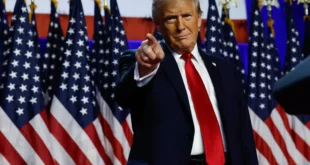Americans’ willingness to work with each other and to learn from one another is becoming ever more deficient.
I have a confession to make: In the age before automated spelling error corrections, I inadvertently used to mistype the words “United States” quite regularly. I accidentally ended up typing it as “Untied” States.
Little did I realize at the time what a fitting political forecast that typo would turn out to be one day.
A great idea in theory
In theory, the United States is based on a great idea: Gradually occupy a near-continent-sized living space. Bring together many different peoples from all over the globe and provide them with the rights to life, liberty and the pursuit of happiness.
Next, preserve an inherent sense of dynamism in that emerging vast land by ensuring via the country’s constitution that the federal government cannot become too powerful — and that the 50 individual states can maintain a sense of their own identity.
Best of all, use those states as a kind of national laboratory to conduct lots of experiments on how the more complex challenges of modern life — from health care and education to the environment and economic growth — can be best met.
Finally, harvest the best practices from that rich laboratory and implement those policies on a nationwide scale that have proved to be most promising and effective.
Here goes the theory
Such a nation would be very well-positioned to excel on all fronts on which human progress is usually measured — the economy, technology, the environment, living standards and levels of personal satisfaction.
At the collective level, this has been called the American Dream. For a long while, it seemed to be working.
Alas, no longer. Now, the entire world gets to see how “Untied” the United States has become.
Don’t overrate Trump as a cause
To be sure, Donald Trump plays a distinct role in this steady deterioration of the vision of the United States. However, in many ways, he is more an — albeit egregious — symptom than the cause of decline.
It is also true that status envy and political grudges have long befallen societies, including those that were successful for a long period.
Inland states depleted and frazzled
What is so stunning about the American example is that quite a few U.S. states, instead of acting as a dynamic laboratory, feel more like a morgue.
Especially the often Republican-led inland states are exhausted from high levels of personal and often public debt, eternal cutbacks and no sense of a brighter future.
The American preference for individualizing — not collectivizing (as in Europe) — economic pain is now exerting a grave civilizational price across the entire country.
The human cost of cutbacks
States balancing their budgets for well over a decade, if not two, by laying off teachers, police and other state workers pay a heavy cost.
Mounting political, economic and social pressures are inevitable. The only steady U.S. “growth market” is rising political polarization and a widespread willingness to vilify those on the other side of the political divide.
In the broader scheme of things, this has heightened the sense of separateness, of pursuing solutions without regard to societal cohesion or the nation as a whole.
Back to Hobbes?
That is why the very Hobbesian notion of “Every man for himself” is not something likely to work well in modern mass societies.
The root cause of the current malaise manifesting itself at the U.S. state level is due to rising complexity. Virtually no man, but certainly no state, is an island any longer.
Everything is connected now. In a more interconnected world, the need to manage rising complexity and competition is inevitable now, whether you live in Myanmar or the United States.
If the center doesn’t hold
It is important to remember that a key requirement for any country to have a constructive future is the belief that the center, in the U.S. case i.e., Washington, D.C., can manage things in a positive fashion.
However, for too long, the actual glue the U.S. capital provided has consisted of transfer payments in the form of highway funds, military contracts and the like.
Trump’s offerings — uttering warm and woolly words about American exceptionalism, while scapegoating immigrants and all foreign nations that are not led by an autocrat or dictator — may raise his supporters. But they are ultimately exercises in futility. The only purpose this has is to disintegrate the nation.
The missing American revolution
Even before the January 6, 2021 riots, the United States has long been on a very slippery slope. The present crisis of political legitimacy is made even more treacherous by the overpowering nature of political and economic interests that defend the status quo, which serves the top 1-3% of Americans so well.
The monster lurking in the background is the fact that the United States certainly had a political revolution early on, but never a social one.
The assumption has long been that this is not necessary. Why? The nation is equipped with great natural resource riches, so Americans will presumably always manage to improve their lot.
The Calvinist falsehood
For a long while, it was possible to argue, based on a rudimentary understanding of Calvinism, that whoever worked hard in America would eventually have it made.
However, that concept stopped working properly quite a few decades ago, long before the onset of Corona. For a few decades already, the effects of very different income and wealth paths inside American society has meant that many Americans try to work harder than ever, without making actual progress.
All of these harsh realities put harsh pressures on families, communities, states and the nation. Short-term fixes, phony compromises and insufficient investment for the longterm are the predictable consequences.
Conclusion
These are somber thoughts about an America that, politically speaking, has long cherished gridlock. However, the longstanding paralysis reigning in the U.S. Congress has only led to more frustrations — and now the full outburst of venom, paired with immense fears, on all sides.
That typo about the “Untied” States is a typo no more. It represents the social, political and economic reality of the country far better than the official, but misleading moniker of the “United” States of America.
 Geostrategic Media Political Commentary, Analysis, Security, Defense
Geostrategic Media Political Commentary, Analysis, Security, Defense





